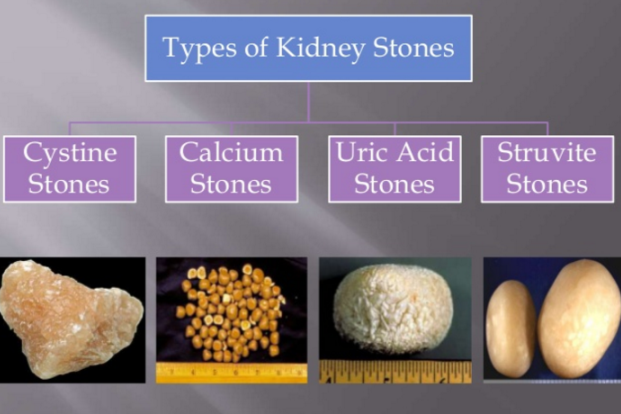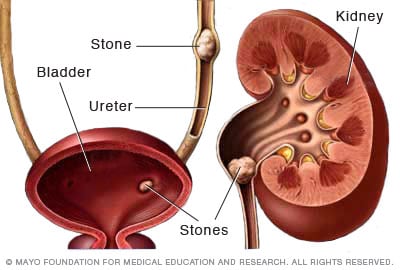Exploring the Effects and Causes of Kidney Stones in Comparison to Urinary System System Infections: An In-depth Overview
The exploration of kidney rocks and urinary system tract infections (UTIs) exposes an intricate interplay of signs and underlying reasons that warrant cautious examination. While both conditions can cause hematuria, they present distinct scientific attributes and arise from different etiological aspects. Understanding the nuances of each condition is critical for reliable diagnosis and administration. What are the crucial distinctions in their signs and symptoms, and how might these inform treatment methods? The response to these questions may offer crucial understandings right into the avoidance and treatment of these usual urological issues.
Overview of Kidney Stones
Kidney rocks, additionally called kidney calculi, kind when specific compounds in the urine crystallize and aggregate, resulting in the development of hard deposits within the kidneys. These rocks can differ in dimension, ranging from a grain of sand to a golf ball, and can be composed of numerous products, one of the most common being calcium oxalate, uric acid, struvite, and cystine. The development of kidney stones is influenced by numerous factors, including nutritional behaviors, liquid intake, and genetic tendency.
Signs of kidney rocks might consist of extreme pain in the back or side, blood in the urine, nausea, and frequent peeing, particularly as the rock relocates via the urinary system. Medical diagnosis generally involves imaging research studies such as ultrasound or CT scans, along with urinalysis to recognize the rock's structure.
Treatment alternatives differ based upon the dimension and sort of rock, in addition to the intensity of symptoms (Kidney Stones vs UTI). Tiny stones may pass naturally with increased liquid consumption, while bigger rocks might call for clinical interventions such as lithotripsy or medical removal. Recognizing the pathophysiology and danger elements related to kidney stones is crucial for reliable avoidance and management
Overview of Urinary System Tract Infections
Urinary system system infections (UTIs) are common bacterial infections that impact any type of component of the urinary system, consisting of the kidneys, ureters, bladder, and urethra. They predominantly happen when germs, typically from the stomach system, enter the urinary system, leading to inflammation and infection.
The occurrence of UTIs is significantly greater in females than males, largely due to anatomical differences, such as a much shorter urethra. Threat variables consist of sexual activity, certain contraceptive methods, urinary retention, and dehydration. The diagnosis of UTIs is generally confirmed through urine tests, which might expose the visibility of microorganisms, leukocyte, or red cell.

Symptoms of Kidney Stones
The pain connected with kidney stones can show up in numerous methods, frequently leading individuals to look for clinical focus. One of the most usual signs is severe discomfort, commonly local in the lower back or side, which might radiate to the abdomen or groin. This discomfort, usually referred to as sharp or cramping, can happen suddenly and might vary in intensity.
In addition, individuals might experience hematuria, or blood in the urine, which can vary from microscopic amounts to noticeable discoloration. This symptom might be accompanied by modifications in urinary behaviors, such as enhanced regularity or seriousness, as well as pain throughout urination. Queasiness and vomiting are likewise prevalent, commonly resulting from the body's response to intense discomfort.
In many cases, individuals may experience high temperature and cools, particularly if an more tips here additional infection creates due to the blockage triggered by the stones. In general, the mix of extreme pain, hematuria, altered urinary patterns, and stomach signs and symptoms can give considerable insight into the presence of kidney rocks, requiring timely medical examination and treatment. Understanding these symptoms is vital for prompt medical diagnosis and effective management of the condition.
Signs of Urinary Tract Infections
Infections within the urinary tract typically offer an array of distinct signs and symptoms that can considerably affect day-to-day live. The most typical signs include a persistent urge to urinate, frequently accompanied by a burning sensation during urination, recognized as dysuria. People might additionally experience boosted regularity of urination, creating percentages of pee each time.
Various other remarkable signs include gloomy or foul-smelling pee, which might suggest the presence of bacteria or pus. Sometimes, pee may appear pink or red as a result of the existence of blood, a condition known as hematuria. In addition, individuals may experience pelvic discomfort or stress, which can additionally intensify the feeling of necessity.
Systemic signs may additionally materialize, such as fever, cools, and tiredness, especially if the infection has actually ascended to the kidneys. It is vital to identify these signs early, as neglected urinary system tract infections can lead to extra serious complications. Kidney Stones vs UTI. Trigger medical focus is recommended when these signs and symptoms are observed, enabling for appropriate diagnostic assessment and therapy to minimize pain and stop further health and wellness issues
Sources Of Each Problem
Often, kidney rocks and urinary system infections develop from distinct yet these details often overlapping causes that can impact people in a different way. Kidney rocks generally develop due to metabolic elements, nutritional choices, and genetic proneness. Increased levels of calcium, oxalate, or uric acid in the pee can lead to rock development. Dehydration, insufficient fluid consumption, and high-sodium diet regimens can intensify these problems, advertising crystallization within the urinary tract.

Recognizing these unique causes is essential for prevention and therapy. Kidney Stones vs UTI. While way of living browse around this web-site adjustments may reduce the risk of kidney rocks, proper hygiene and prompt therapy of urinary system tract infections are essential for lowering their reappearance and connected problems
Verdict
In recap, kidney rocks and urinary system infections present unique symptoms and underlying causes. Kidney rocks are characterized by serious discomfort and metabolic elements, while urinary system system infections mainly entail bacterial infections leading to urinary necessity and pain.
The exploration of kidney stones and urinary system tract infections (UTIs) exposes an intricate interplay of symptoms and underlying reasons that necessitate careful assessment.Urinary system system infections (UTIs) are common bacterial infections that influence any kind of part of the urinary system, including the kidneys, ureters, bladder, and urethra.Often, kidney rocks and urinary system system infections occur from unique yet occasionally overlapping reasons that can affect individuals in different ways.In recap, kidney rocks and urinary system tract infections present distinct signs and underlying reasons. Kidney rocks are identified by extreme discomfort and metabolic factors, while urinary system system infections primarily involve bacterial infections leading to urinary urgency and discomfort.